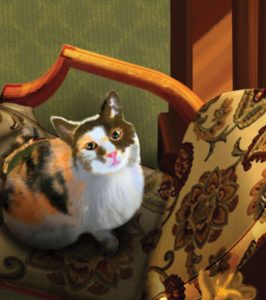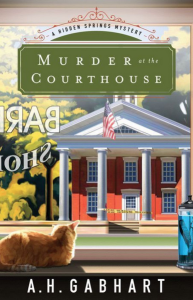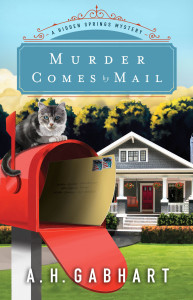This was an exquisite story! Two people unlikely to continually meet ~ the new landowner of his inherited property, Hampton Hall; and Miss Ellison, the noteworthy tender of St. Hampton Heath's villagers with dire needs, poor tenant families cared for by her mother before her.
The dialogue is fantastic as the antagonists spar back and forth with words ~ which becomes a distinct fascination of quick wit between them. Out of the ordinary of aspiring ladies he usually meets, he is quickly drawn to her while she doesn't appear to be interested in his arrival at all. Not coyly, but ... not interested.
Meet Miss Ellison's companion and chaperone allowing her to venture through the hillsides without an escort ~ her sweet beagle, Mickey, alerting her of trespassers in their domain and an excellent purveyor of true interests.
Such a beautifully written story encompassing regrets, introspection, forgiveness, compassion, amid the realization of a love that surpasses all boundaries set by man.
I hope we will continue to glimpse Nicholas and Livvie in the forthcoming stories, featuring a closer view of secondary characters introduced in this debut novel. I loved the adventures of God's grace received in a humble life turned to Him.
CHAPTER ONE
St. Hampton Heath
Gloucestershire, England
June 1813
"WHY, LIVVIE! WHATEVER are you doing?"
Lavinia Ellison placed down her gardening trowel, swiped perspiration from her brow, and smiled up at her friend. "Good morning, Sophy."
"Oh, er, yes, good morning." Sophia Milton's nose wrinkled as she peered at Lavinia's handiwork: a tall pile of weeds. "But where is Albert? Surely tending the garden is his responsibility. I know Mama would never permit me to do so, let alone without a hat —"
"Albert is tending our old Jersey. She has been rather ill lately." She avoided the question of permission. After all, neither the preparations for Papa's sermon nor Aunt Patience's Sunday school lesson deserved interruption for such a minor matter.
"Oh. That's unfortunate for you all."
Lavinia nodded as she dusted off her skirts. Sally's sad decline was unfortunate not just for their household, but for the poor families in the village blessed by her superior milk production. Still, God would provide. And if He didn't, Lavinia would find a way. She pushed the twinge of worry to one side and led the way indoors, cleaning up quickly before directing her guest to a seat in the morning room. She picked up her embroidery. "So, what brings you here on this glorious sunny day?"
"Oh, Livvie! You'll never guess who is coming tomorrow night!"
She swallowed a smile at her friend's wide cobalt eyes. Sophia Milton was notorious for her passions. "Alas, you are correct. Do tell."
"Father said the new earl has accepted the invitation to our musicale!"
The new earl. Lavinia's chest tightened.
Sophia sighed. "I saw him from the window when he called on Papa yesterday. He's
ever so handsome. So tall and dark ..."
Yes, but a handsome appearance counted for naught unless matched by good character and actions. She quashed her uncharitable thought, offered a polite nod, and cast her attention back to her ever-frustrating needlepoint as her visitor continued listing his charms. Why Aunt Patience insisted that Lavinia embroider was beyond comprehension. The list of accomplishments for young ladies was ridiculously long, especially when young men did not have nearly so many requirements.
After Sophia finally stopped for breath Lavinia murmured, "Your mother must be very happy."
"Oh, yes! And Papa, too."
But of course the squire would be pleased. The second-largest landowner in the district had a wife whose social aspirations far surpassed their sizeable income. To receive such a distinction would prove most gratifying. She frowned at the miniscule mistake she'd just made in her stitching. Why couldn't sewing be simple and enjoyable, like music? She swallowed a sigh and glanced up.
Sophia's smile had dimmed. "But Mother has heard he is something of a flirt, so we should be on our guard."
"I hardly think I need be on my guard. I would think the prettiest girl in Gloucestershire should be more concerned about attracting attention." Lavinia gazed without envy at her visitor's artfully styled blond tresses, crimson cheeks, and fresh new muslin, overlaid with embroidered blue flowers. Lady Milton might have her shortcomings, but dressing her daughter to disadvantage was not one of them.
"Livvie, you do not seem terribly thrilled."
"You should know by now that I am quite unwilling to be excited about someone I have never met. But after I meet him, if indeed he does condescend to appear, I shall endeavor to seem excited for you. Will that suffice?"
Sophia laughed. "Must you always talk such nonsense?"
"I'm afraid I must, if only to balance some of the prosiness of ordinary conversation."
The younger girl's brows knit together. "Oh no!"
"What is it?"
"Now we know the earl shall attend, whatever shall I wear?"
SOPHIA SOON SWEPT from the house in a flutter of muslin and ecstasy, leaving Lavinia to open the window, drink in the delightful scent of the late flowering lilacs, and then exchange her embroidery for her sketchbook. As she sketched the glorious rainbow of pansies cascading down the garden's rock wall, she thought on the Earl of Hawkesbury she had once known.
Lord Robert had been as kind as her father: generous, interested in his neighbors, seeking the well-being of his tenants and the local village of St. Hampton Heath. A truly good man. But his death two years ago had precipitated a series of family tragedies. George, his younger brother, had died of influenza within six months of inheriting the title. Less than a year later, while his younger son had been engaged in heavy fighting on the Peninsular, George's elder son, James, had been killed in a hunting accident. Her fingers clenched.
His death she could not even pretend to mourn.
A blur of tan-and-white fur leapt through the open window. Mickey barked and jumped onto her lap, as if sensing her disquietude. She hugged him close as her art pencils spilled to the floor. Perhaps Sophia and her parents were right to be excited about the district's new addition. Lately, Hampton Hall had taken on a slightly neglected look, thanks to the bailiff' s less than stellar efforts. And the family's prolonged absence meant the little things Lord Robert formerly noted, such as cottage roof repairs and sending baskets at Christmastime to the poor—services that made a great difference in the lives of the less fortunate—these things had been missed.
"If the new earl fulfills his obligations, he
might prove a blessing, Mickey."
He barked his agreement, wriggled away, and dashed through the open window to the tangled underbrush of the rose garden beyond. Tangled underbrush she would resume clearing this afternoon, when Papa and Aunt Patience were sure to be absent and unable to object.
She returned her attention to her sketchbook, working to capture the purple heart of a pansy, until the swish of skirts announced her aunt's arrival. "So, little Sophia hopes to snag herself a Hawkesbury, does she?"
"I don't believe Sophy has any such idea, although Lady Milton may."
An appreciative twinkle lit her aunt's deep blue eyes. Over the past fourteen years, Lavinia had learned many things from this independent, intelligent woman, yet sometimes she still found it difficult to believe that Patience West was Mama's sister. Mama had lived up to her name. Grace had filled everything from her musical voice to her pretty mannerisms and her compassion for others. Patience's forthright, practical ways contrasted as strongly as her dark hair differed from Mama's—and Lavinia's own—fairness.
"That woman would be far better off teaching her daughters useful accomplishments and knowledge rather than filling their heads with frippery and empty dreams." Aunt Patience smoothed her severe gray dress, which matched Lavinia's.
Lavinia gestured to the discarded needlepoint. "Useful accomplishments?"
A thin smile escaped her aunt's lips. "One of these days, my dear girl, you will realize that not every worthwhile endeavor can be as enjoyable as writing letters to
The Times."
Memories arose of the past week's efforts to bring solace to two poor tenant families, endeavors of far greater worth than needlepoint, and far from pleasant: The sour stench of sickness, only slightly alleviated by the aroma of the hearty beef stew she'd brought. Dark, dank cottages filled with a dense chill no fire could chase away. The sad-eyed desperation of wee children who seemed to suspect their mother might die soon. The old ache rippled across Lavinia's soul. Tears pricked. She blinked them away. The earl simply
must help.
Her aunt patted her arm. "Worthy endeavors are most often rather less than enjoyable."
Lavinia nodded. Good deeds were not about personal pleasure but pleasing God: visiting the sick, biting one's tongue, rooting out envy, forgiving enemies.
And allowing the past to remain buried in the churchyard.
* * *
The seventh Earl of Hawkesbury leaned back in his saddle. Fields of sun-ripened barley waved golden in the June sunshine. The scent of fresh-dug earth filled his nostrils as a light breeze ruffled nearby hedgerows. In the distance, the village of St. Hampton Heath reposed peacefully, watched over by the gray-stoned church. Such an idyllic pastoral scene, yet its peace did little to ease the tension edging his heart.
Fourteen years since that disastrous day. Fourteen years filled with study, travel, and then war. Fourteen years spent avoiding this upcoming interview. Sweat beaded his brow as it had the first time he faced cannon fire. He swiped at the moisture, disciplined his limbs to remain still and not turn his horse for home.
Midnight snorted and stamped his hoof, impatience pulling at the bit.
He patted his horse's neck. "There, there, boy. This surely cannot be as bad as Burgos."
The great horse nickered, as if remembering the chaotic withdrawal of allied troops from that Spanish fortress amidst rain and cold.
Nicholas's jaw tightened. Too many good men had died or been captured in that campaign, back when he'd been plain Captain Stamford. Thank whatever gods may be for his horse whose faithfulness had brought him safely to Ciudad Rodrigo. He stroked the glossy mane with tender affection.
Midnight lowered his head, tugging at young grass.
"At least we have food now, don't we, boy?"
Midnight's ears flickered. No French cavalry had chased them harder than starvation, the pangs of hunger carving deeper than the bullet wound in his thigh.
No, the only thing chasing Nicholas now was his conscience.
He shook off the memories and squared his shoulders. "One can only hope this mission proves as unexceptionable as the first, eh?"
Small hope of that.
After wading through the paperwork his bailiff had prepared, his first port of call had been to visit the local squire and baronet. Sir Anthony's delight at his impromptu appearance had been cast in the shade by his effusive invitation to some local assembly, which made him wonder how many unmarried daughters the man had. All soldierly assurance had fled, replaced by mealymouthed capitulation. This visit would be equally trying, but for very different reasons.
"Come. We best get on, before someone overhears me talking to you, questions my sanity, and insists I be sent to Bedlam."
He tapped Midnight's flanks and rode down the drive. They soon arrived at a modest, red-brick manor house, surrounded by oaks and fruiting trees. A servant girl was kneeling in the adjoining weed-strewn garden.
"Excuse me," he called. "Is your master at home?"
The girl squinted up. Dirt smeared her face, her hair tucked under a monstrously ugly mobcap. He nudged Midnight closer. Her gray eyes widened and she backed away. Poor simpleton.
"There is nothing to be afraid of. He is a good horse."
She raised a hand to shade her eyes but said nothing. Perhaps she was a mute.
"I am the seventh Earl of Hawkesbury." How strange it felt to say so, like he was defrauding the world, just as his brother had defrauded his creditors. He swallowed bile. "Now, can you tell me if your master is within?"
The pink staining her face as he announced himself gave way to something rather less maidenly as she lifted her chin. "I cannot."
"I beg your pardon?" Who was this chit to refuse a major's command? To refuse an earl's command? He put iron in his voice. "Tell me, is your master home?"
"No."
He jerked a nod, wheeled Midnight around, and then paused. "Wait. Do you mean to say he is not home, or do you merely defy me?"
A trace of a smile flashed across her face before her features settled into coolness. "If you are enquiring about Mr. Ellison, he is at home. As for my master, I cannot be expected to own what I do not have."
He blinked. Perhaps he was the simpleton, after all. The most unusual servant girl picked up her basket of weeds and disappeared around the side of the house. He stared after her, until Midnight's restless nickering recalled him to his mission. He secured his horse, rapped on the heavy wooden door, and waited. Apparently the rude maid had neglected to inform anyone of the visitor. What kind of servant was she? And what did she mean by saying she had no master?
A rattle of locks dragged him from his musings. Another servant greeted him, wide-eyed with the customary awe his rank and fashion usually merited, and ushered him inside. Nicholas was announced and led into a cluttered drawing room, lined with bookcases.
An older gentleman looked up. "Lord Hawkesbury! Welcome back."
"Thank you." He sat at his host's request and studied the reverend. Deep lines creased a face topped with graying brown hair. He would have been somewhat plain save for a pair of shrewd gray eyes that gave cause to wonder just how much the older man saw.
"The village trusts you will enjoy your stay here."
"I hope, Mr. Ellison, those are your sentiments as well."
"Of course, sir."
Nicholas glanced away. A pianoforte stood near the window, stacked with an untidy pile of papers. "I never had the opportunity to say how very sorry I am for the incident of years ago."
Which was a lie. He'd had the opportunity. Uncle Robert had begged, cajoled, even threatened both of his nephews with banishment, but the pride running so deep in his mother had forbidden either of her sons to apologize.
Until now.
He steeled himself to meet his host's justifiable recrimination—but saw compassion instead.
The shame doubled and redoubled, twisting his heart into knots. He forced himself to remain still and not squirm like a child. Many years had passed since anyone had made him feel quite so uncomfortable.
The reverend steepled his fingers and leaned back in his leather armchair. "It was my understanding that it was your brother and his friend who were responsible."
He gave a small shrug, dropping his attention to his highly polished Hessians. "For the actual incident perhaps, but I fear my words goaded them. For that I am truly sorry." His gaze lifted.
"And I am truly sorry that you have carried this weight for so many years." Something like peace and acceptance suffused the reverend's face. "You and your brother were forgiven a long time ago."
Nicholas swallowed. "By yourself?"
"Aye. And my daughter."
Memories flashed of the slight, golden-haired girl keening over a broken, bloodied body. He dragged guilty thoughts away and nodded stiffly. "Thank you, sir."
He glanced up at a lovely watercolor of St. Hampton Heath's old Norman church. The square stone tower and small curved windows had spoken of assurance for countless generations. Peace teased the restlessness within him.
"You will attend services?"
He suppressed a groan. Yet another duty he had no wish to perform. "Perhaps." The wise eyes seemed to search his soul, prompting a more enthusiastic, "I will try."
The reverend nodded. "I believe it will be a great blessing for our little village to have one such as yourself take an interest." He smiled gently. "I trust your time here will also prove a great blessing for you, my lord."
His throat cinched. The undeserved warmth and kindness filling the drawing room seemed to almost choke him. He couldn't take another jot. He rose. "Thank you, Mr. Ellison. Good day, sir."
After exchanging a slight bow with his surprised host, he exited the room and strode down the dim hall to the front entrance, fresh air, and freedom.
He dragged in great cleansing breaths as he untied Midnight, his heart hammering its insistence that he get away. His fingers seemed clumsier than when he was a boy in short pants.
From somewhere inside, a door slammed.
As he mounted his horse, a dark gleam of gold flashed through the apple trees on the manor's southern side. A small beagle appeared, yapping at Midnight's heels, drawing a dismissive snort from the great beast. Nicholas wheeled his horse around, down the dusty drive, back toward the lonely three-storied stone pile that was the countryseat of the Earl of Hawkesbury.
His inheritance. Not a blessing, like the reverend seemed to believe, but both a burden and a curse.
This story is so strong as the realization of our own pride and merits we expel on someone else. So reminiscent of Psalm 139. We are known and seek to know who we truly can be. Accepted in the beloved.























 Tess Beaumont enlists in the newly formed WAVES (Women Accepted for Volunteer Emergency Service) yet finds she must go through an arduous interview system before being selected or rejected. Wanting to be seen as useful and not projected as another pretty face, Tess wants to merit service to her country. Substance. Purposeful.
Tess Beaumont enlists in the newly formed WAVES (Women Accepted for Volunteer Emergency Service) yet finds she must go through an arduous interview system before being selected or rejected. Wanting to be seen as useful and not projected as another pretty face, Tess wants to merit service to her country. Substance. Purposeful.













